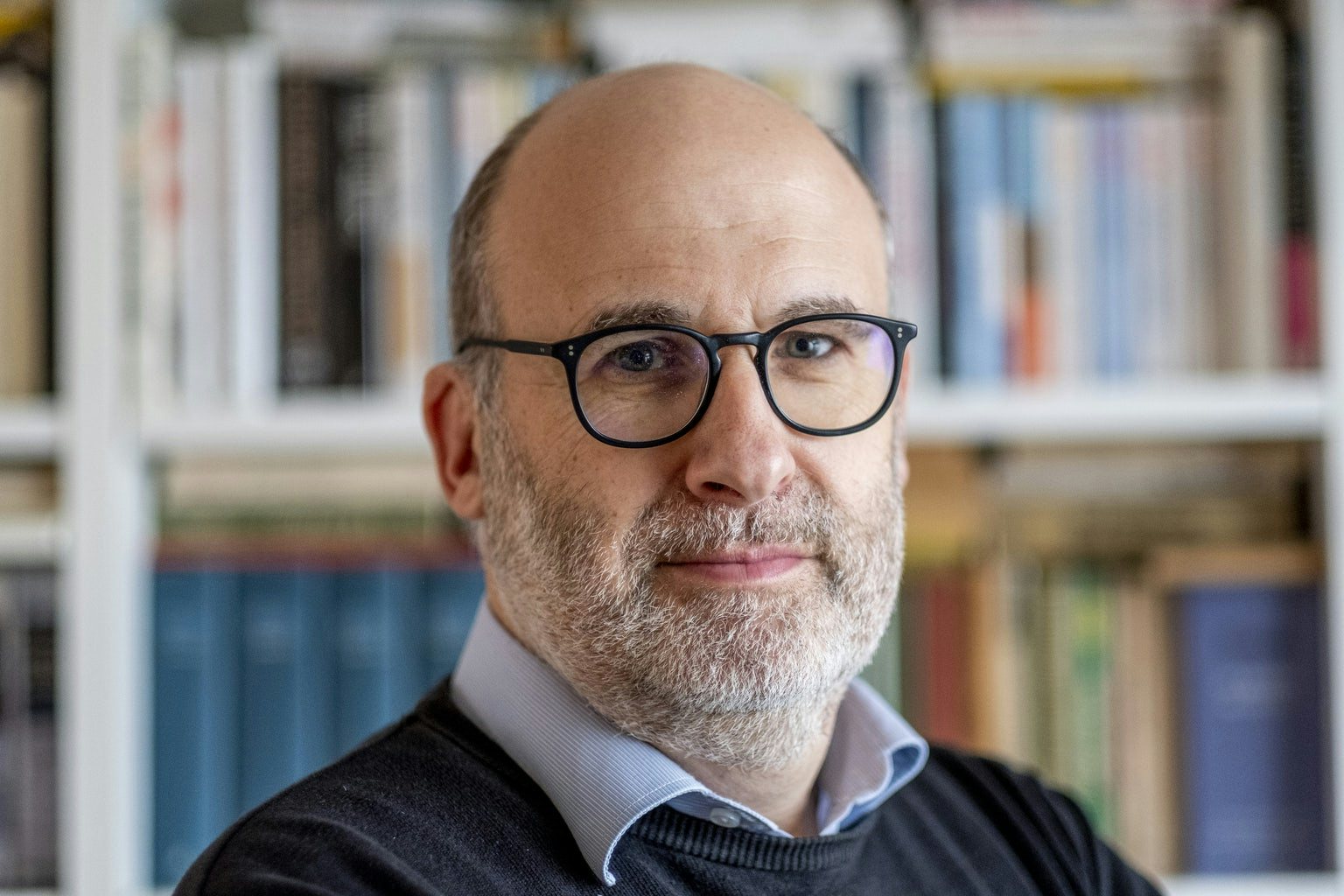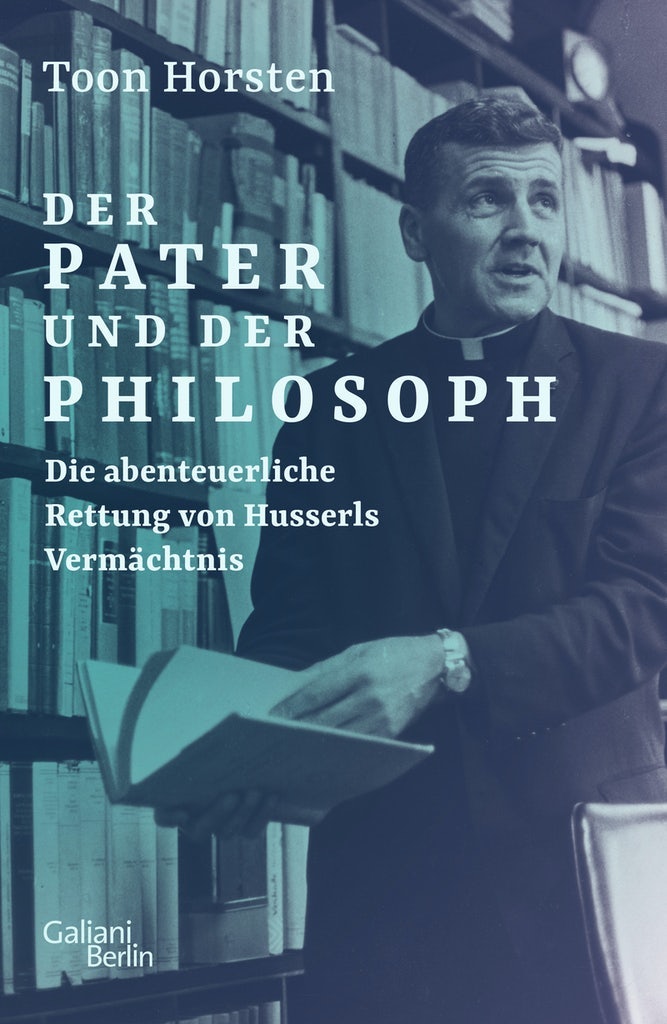Old family photo brings Toon Horsten German success

'The Priest and the Philosopher’ first attracted attention abroad in the Netherlands. Journalist and professor of philosophy Ger Groot wrote an article for NRC Handelsblad applauding the book. Author Toon Horsten was very pleased by that. His search for Father Herman Van Breda, the main character of the book, started by chance years before at a family gathering and eventually resulted in a book that took him into the non-fiction top ten of German public broadcaster ZDF and weekly Die Zeit in the summer of 2021. In October the book will travel on to Spain and a Japanese translation is already in the works.
Getting into the German non-fiction top ten means at the very least that you’ve stepped outside a niche. What has that brought you?
It’s as pleasant as it is surreal. I was leafing through my parents’ wedding album and wondered who that smiling and smoking priest was in a black-and-white picture with my grandmother. Later I discovered that, among other things, he’d been awarded both an honorary doctorate from Freiburg and a Yad Vashem medal from the state of Israel. So I decided to investigate further. That eventually resulted in my book, with which many years later I accompanied a German camera crew through Leuven to make a piece for television about the priest.
In Germany Edmund Husserl and Edith Stein are part of the collective memory, and philosophy has a far more central place in society.Toon Horsten

The extent of the interest in Germany isn’t too hard to explain. Before and during the Second World War, Van Breda rescued the intellectual legacy of philosopher Edmund Husserl, and later that of philosopher and Catholic mystic Edith Stein, who worked for Husserl. In Germany they are part of the collective memory, and philosophy has a far more central place in society. Something else that undoubtedly plays a part is that Van Breda is regarded as the reverse of Martin Heidegger, the dreamed-of successor to Husserl who let his (Jewish) mentor down so badly and sided with the national socialists. Heidegger is therefore the great philosopher who at the moment of truth made all the wrong choices, Van Breda the small, insignificant philosopher, a priest what’s more, who did what needed to be done. A great thinker who was also a man of action – that was how French philosopher Emmanuel Levinas saw the contrast, at any rate. Levinas was a good friend of Van Breda and lost many relatives in the concentration camps. He was never willing to forgive Heidegger for his wartime stance.
Another thing that I noticed straight away is that the German books market is larger than ours, so you can have a far bigger and more diverse range of book reviews. Reviewers always go into depth, too, even when they’re only asked to write a short piece. They take their job very seriously.
Marlene Müller-Haas translated ‘Der Pater und der Philosoph’ (Galiani, Berlin). What influence has that had on your work?
The questions asked by Marlene were refreshing. She examined some passages in great detail and sometimes set about them almost as a fact checker. Here and there the text turned out to leave more room for interpretation than I had realized. Fortunately no major errors came to light regarding the content, but in some places I have adjusted the Dutch text for the most recent (fourth) edition of the book. It’s a matter of a few details, but all the same, the book has been improved by it. Of course I could respond like that only because my German, as a reader at least, is reasonably good. It’s a different matter with the Spanish and especially the Japanese translation.
In the Dutch and German media your book was recommended all over the place. Which of the articles pleased you the most?
It was only because of the attention it received in the Netherlands that the book really started to take off in my own country. So I’m grateful that Ger Groot, a man whose work I have always greatly appreciated, was the first to wave the book in the air. In Germany the first big review in the Frankfurter Allgemeine Zeitung had more or less the same impact. That article lit the fuse. As I’ve already said, most reviewers take their job very seriously, so it was always exciting to read those pieces. The article in the Tageszeitung (TAZ) was interesting, for example. The reviewer asked how many people Van Breda would have been able to save if he’d dedicated the effort he put into saving manuscripts to saving Jewish refugees or people in hiding.
Sometimes it pays to go on stubbornly doing your own thing.Toon Horsten
‘The Priest and the Philosopher’ was first published in 2018. Is there another book on its way?
I’ve started work on a new book, and again I’ve begun to scratch away at a human-interest story from my own life. It’s something I came upon entirely by chance that turns out to have a whole story behind it. I could say that all my book projects have taken surprise and astonishment as their starting point. At the moment I’m in the middle of the research phase, and it’s all been a bit delayed by the coronavirus crisis. I’m calmly carrying on and I’ll soon be leaving for Berlin to do more research. Then we’ll see what it ultimately becomes. When I was working on ‘Landlopers’ (Vagrants), my first major non-fiction project from 2013, quite a few people thought it was a bizarre subject to choose. But the vagrants’ colony in Wortel, which is central to that book, was listed just this week as a Unesco World Heritage site. Initial reactions by various publishers to ‘The Priest and the Philosopher’ were lukewarm too. Fortunately Ronald Grossey, whom I’d worked with before, had returned to the publishing trade and started work at Uitgeverij Vrijdag. I sent him the manuscript and an hour and a half later he rang me enthusiastically. ‘I’ve got to page sixty and I want to publish this!’ Sometimes it pays to go on stubbornly doing your own thing.
For the next project Toon Horsten has been granted a subsidy from Flanders Literature and for the German translation of 'The Father and the Philosopher' a translation grant was granted.